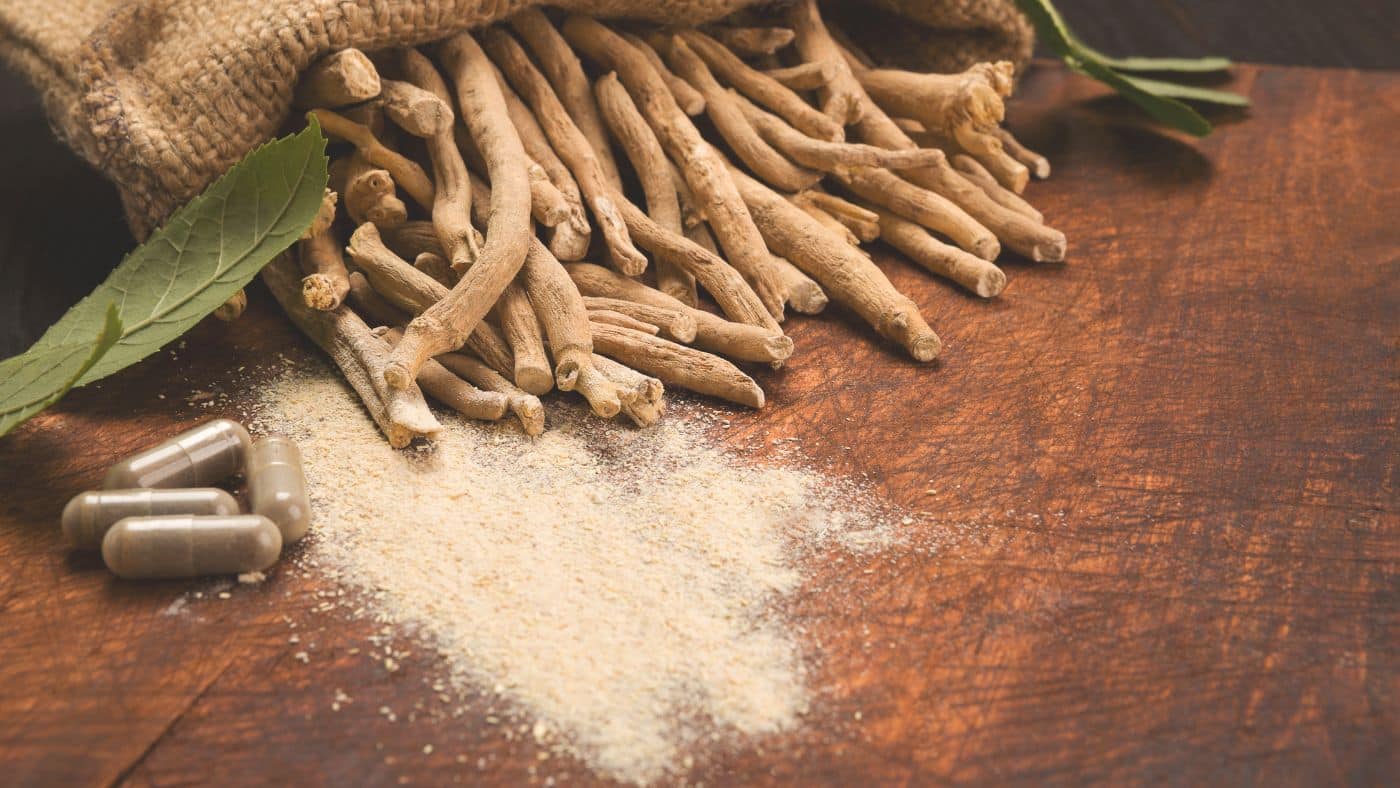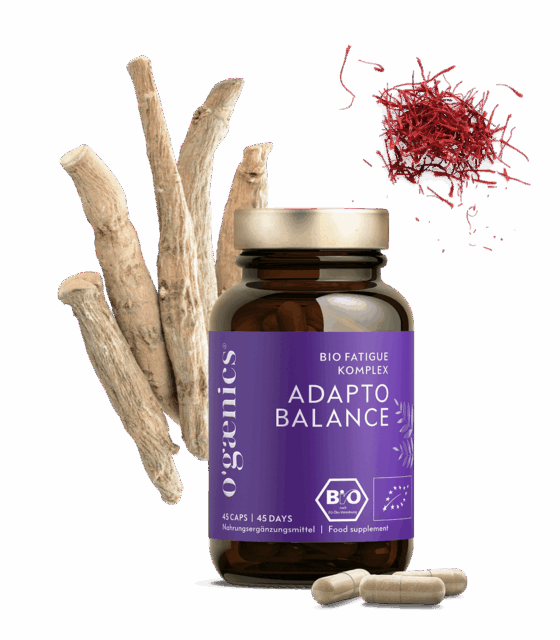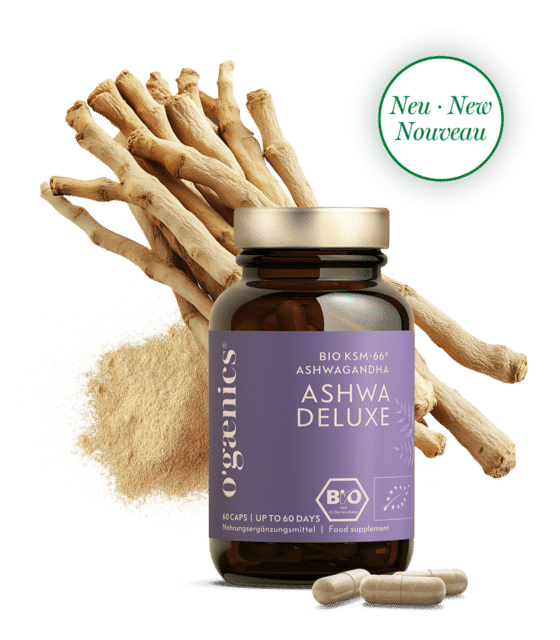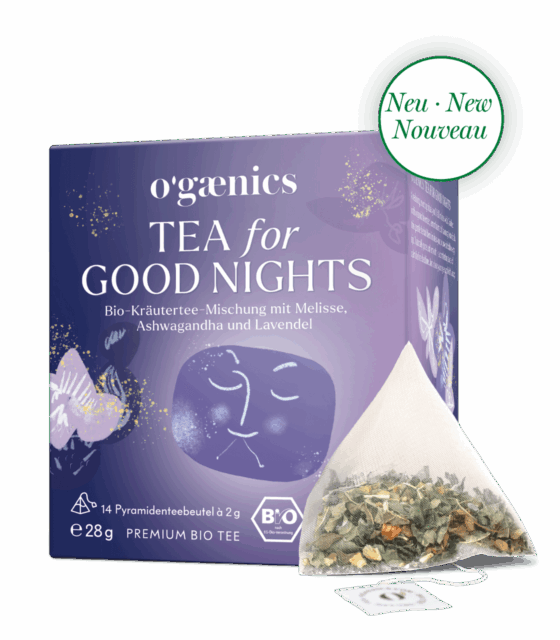Hormone chaos, PMS, stress? How ashwagandha helps women naturally
Do you sometimes feel out of balance – be it due to hormonal fluctuations, poor sleep, low mood or PMS? Then you should get to know ashwagandha. This powerful adaptogen from the Ayurvedic healing arts is currently experiencing a real comeback – and for good reason: numerous studies have proven its many benefits, especially for women.
Whether for natural hormone balance, alleviating menopausal symptoms, increasing libido, improving your sleep or calming stress – ashwagandha can be a valuable support in your everyday life. In this comprehensive guide, you will learn all about the effects, use and safety of this extraordinary herb. And you will learn how you can use it specifically for your health.
Understanding ashwagandha and its origins
Before we explore the many benefits of ashwagandha for women, it’s important to know what this herb actually is and where it comes from. Ashwagandha – botanically Withania somnifera – is a powerful medicinal herb that has been a central part of traditional healing for centuries.
Known for its adaptogenic properties, ashwagandha is a versatile herb that has received a lot of attention recently. Its roots and berries, rich in medically active ingredients, are used in the form of teas, powders and dietary supplements. The plant originates from India, the Middle East and parts of Africa – regions where it is traditionally used for a variety of health purposes.
What is ashwagandha?
Ashwagandha is an adaptogenic herb that is known for its health benefits. The roots and berries are particularly rich in active ingredients and are often consumed as a tea, powder, tincture or in capsule form.
The plant is valued for its ability to relieve stress and anxiety, improve sleep quality and support cognitive function. Other possible effects: Lowering blood sugar levels, promoting muscle strength and supporting the cardiovascular and immune systems.
Ashwagandha is also associated with positive effects on fertility and sexual well-being – especially in women. However, more extensive clinical studies are needed to confirm these effects.
Origin of ashwagandha
Ashwagandha is originally from India, the Middle East and Africa. The plant is also known as Indian winter cherry or Indian ginseng and can be recognized by its yellow-green leaves and red berries.
Ashwagandha already played an important role in Ayurvedic medicine, one of the oldest medical systems in the world. Translated from Sanskrit, Ayurveda means “knowledge of life”(Ayur = life, Veda = knowledge).
An important Ayurvedic practice is the so-called Rasayana, which means “path of the elixir of life”. The aim is to increase longevity and quality of life – ashwagandha is a classic Rasayana herb.
Ashwagandha and hormone balance
In the complex interplay of female hormones, balance is the be-all and end-all. Ashwagandha supports this hormonal balance through its effect on the endocrine system, which controls mood, stress response and reproduction.
How ashwagandha supports hormonal balance
Ashwagandha helps to regulate the release of the stress hormone cortisol, which can have a positive effect on sleep, mood and menstruation. It can also promote healthy thyroid function, which in turn has an influence on energy, metabolism and the menstrual cycle.
The complexion also benefits: A hormonal imbalance – such as increased testosterone levels – can lead to spots and oily skin. Ashwagandha helps to alleviate such symptoms through hormonal balancing.
Women report positive effects on the menstrual cycle, PMS, libido, fertility and menopausal symptoms. However, further large-scale studies are needed.
Ashwagandha and menstrual health
Ashwagandha can help to regulate the menstrual cycle and alleviate PMS symptoms – thanks to its hormone-balancing and stress-reducing effects.
Cycle regulation with ashwagandha
The plant has an effect on FSH, LH and other reproductive hormones. It can also contribute to regular cycles by reducing cortisol (stress hormone). Ashwagandha can have a supportive effect on hormonal imbalances such as PCOS, endometriosis or PID – also thanks to its phytoestrogens.
Reduction of PMS symptoms
Ashwagandha can alleviate typical complaints such as cramps, irritability, tiredness and sleep problems. Its mood-enhancing, anti-inflammatory and calming effects make it a popular natural companion during your period.
Ashwagandha and sexual health
Ashwagandha is also used to promote female sexuality. Studies show that it can help to increase desire, arousal, orgasmic ability and satisfaction – especially in women with HSDD (Hypoactive Sexual Desire Disorder).
In studies, for example, women took 300 mg of ashwagandha twice a day for eight weeks – with significant improvements according to the Female Sexual Function Index (FSFI) and Female Sexual Distress Scale (FSDS).
The link to better sleep also plays a role: well-rested women report a more fulfilling sex life more often.
Ashwagandha and the menopause
Many women are looking for natural solutions during the menopause – ashwagandha offers just that.
Relief from menopausal symptoms
In a 2021 study, taking 300 mg of ashwagandha twice a day for eight weeks led to fewer physical, psychological and urogenital symptoms. The researchers observed an increase in estradiol and a reduction in FSH and LH – both typical of the hormonal changes in this phase of life.
Ashwagandha can also help to control sleep disorders, irritability, anxiety and mood swings – and thus significantly improve quality of life.
Safety during the menopause
Ashwagandha is generally considered safe. However, caution is advised in the case of thyroid disorders, liver problems, before operations, during pregnancy and while breastfeeding. Interactions with medication (e.g. antihypertensives, antidiabetics, blood thinners) are also possible.
Start with a low dose and increase it if it is well tolerated. Choose a preparation from a reputable source to avoid contamination.
Not all ashwagandha is the same: what you should look out for
Ashwagandha(Withania somnifera) is one of the most valued medicinal plants in Ayurveda. But beware: not every ashwagandha product is automatically safe or effective – the quality varies enormously.
Root or leaf? A big difference
Traditionally, only the root of ashwagandha is used in Ayurvedic medicine – it is considered to be well tolerated and proven to be effective. However, leaves are also increasingly ending up in inferior products, often for cost reasons. But they harbor risks:
-
Ashwagandha leaves contain particularly high amounts of withaferin A – a cytotoxic compound which, according to studies, can have a potentially liver-damaging effect. This is also the reason why you will find more warnings about ashwagandha on the internet.
Study-proven extract: KSM-66®
At Ogaenics we use the branded extract KSM-66 Ashwagandha®, one of the world’s best researched, pure, organic Ashwagandha root extracts. Every batch of raw material used for this purpose is consistently checked for identity (root components only).
In addition, KSM-66 Ashwagandha® has been studied in over 50 human clinical trials. The participants were systematically monitored for possible side effects, including liver and kidney function and thyroid levels. The result: none of these studies showed evidence of liver damage or other serious side effects.
Use and dosage of ashwagandha
In order to benefit from the positive effects of ashwagandha, it is important to use it correctly.
Recommended dosage
Frequently recommended: 300 mg ashwagandha root extract twice daily. This is the dosage used in most ashwagandha studies.
As high single doses are not always well absorbed, smaller amounts spread out over the day can be more effective.
Best forms of intake
-
Tea: Gentle start, relaxing and hydrating.
-
Powder: Ideal for smoothies, overnight oats or nut butters. Do not heat!
-
Capsules: Practical for constant intake and a clean product.
-
Tincture: Highly concentrated and may take some getting used to in terms of taste – simply add to water or juice.
Conclusion: Ashwagandha for women
Ashwagandha(Withania somnifera) is a versatile herb with impressive benefits for women’s health – from hormone balance to sexual health to relieving menopausal symptoms.
The studies are promising. So if you want to increase your well-being in a natural way, ashwagandha could be just the thing for you. But always talk to your doctor first.
Ogaenics products with ashwagandha
-
Adapto Balance
6-week supply for psyche, nerves and energy with Safr'inside™, organic KSM-66® Ashwagandha and an organic vitamin B complex49,90 €1.386,11 € / kg
-
Bestseller
Ashwa Deluxe
Organic KSM-66® Ashwagandha, premium root extract, vegan and certified organic, with 5% withanolides19,90 €686,21 € / kg
-
Bestseller
Tea For Good Nights
Tea for Good Nights organic sleep tea with 14 eco pyramid tea bags19,90 €710,71 € / kg
-
Tea For Good Vibes
Tea for Good Vibes organic herbal tea relaxation with 14 eco pyramid tea bags19,90 €710,71 € / kg















 No products in the cart.
No products in the cart.